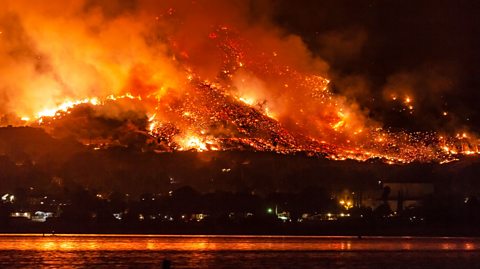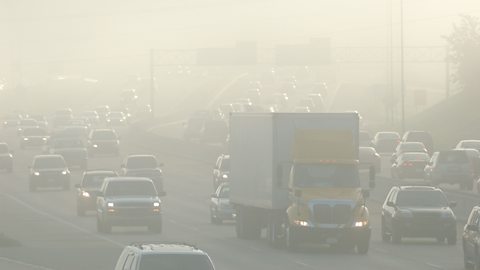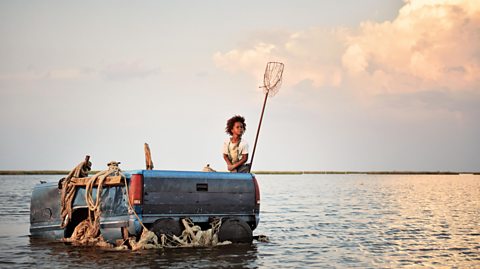
Welcome to The Regenerators.

From climate change to pesticides, the environment is facing a number of different challenges right across the world.
Across the decades, songs have been written on on countless different world issues, including some that examine the state of our natural world.
WeÔÇÖve already taken a look at how climate change has been discussed on film, so now itÔÇÖs time turn our attention to music.
From the 1970s to the present day, we explore four songs that have highlighted environmental issues and the singersÔÇÖ motivations.
 Image source, Kevin Key / Slworking
Image source, Kevin Key / SlworkingAll The Good Girls Go To Hell by Billie Eilish (2019)
Hills burn in California/My turn to ignore ya/Don't say I didn't warn ya
With these lyrics, Billie is warning us that a failure to act on increasing global temperatures could lead to more wildfires. Every year California experiences numerous wildfires, with most occurring between July and October.
Within the songÔÇÖs music video, Billie is depicted as an angel struggling to break free of an oil spill. When she eventually emerges, her white wings are soaked with oil and she is surrounded by flames.
In an accompanying statement to the video, Billie wrote that "our earth is warming up at an unprecedented rate, icecaps are melting, our oceans are rising, our wildlife is being poisoned and our forests are burning".
Wildfires can occur naturally, with dry vegetation ignited by a lightning strike or the heat from the Sun. However, some wildfires are caused by human carelessness, such as discarding lit cigarettes, or deliberate arson. As the world gets drier and hotter due to climate change, the frequency and severity of wildfires will increase.
Wake Up America by Miley Cyrus (2008)
Oh, the earth is calling out/I wanna learn what it's all about/But everything I read's/'Global warming', 'going green'/I don't know what all this means
Like so many people around the world, the Miley Cyrus of 2008 wasnÔÇÖt too sure what global warming was, but she was aware that it was something she needed to get clued up on. Sometimes, the terminology surrounding climate change can get a bit confusing and overwhelming, but there are loads of resources to help explain.
Global warming is the unusually fast increase in the EarthÔÇÖs average surface temperature and is caused by ÔÇïÔÇïThe gases responsible for global warming - carbon dioxide, methane, nitrous oxide and CFCs (chlorofluorocarbons). being released into the atmosphere, known as A potentially harmful gas that is produced and sent out into the air, for example carbon dioxide.. Examples of greenhouse gases are carbon monoxide and methane.
These greenhouse gases absorb heat from the Sun, and as the concentration of greenhouse gases increases, so does the EarthÔÇÖs temperature. The temperature of the Earth has increased by an average of between 1 and 1.2 degrees Celsius over the last 100 or so years.
Later in the song, Miley calls on Americans to step up and take action to protect the Earth. We can slow down global warming by reducing greenhouse gas emissions, whether by switching to renewable energy sources or making small changes to our daily lives, like using public transport.
 Image source, Art Wager
Image source, Art WagerBig Yellow Taxi by Joni Mitchel (1970)
Don't it always seem to go/That you don't know what you've got 'til it's gone/They paved paradise, put up a parking lott
Joni Mitchel wrote Big Yellow Taxi whilst in Hawaii, where she was she shocked by the juxtaposition of the beautiful green mountains and the hotel car park. To her, it seemed like a slice of paradise was being turned into a concrete jungle, and reminded us all to treasure what we have while itÔÇÖs still here.
Within the songÔÇÖs verses, Joni highlights some of the specific threats that the natural world faces. At one point, she asks farmers to stop using the pesticide DDT on their crops because of the impact that it was having on birds and bees. When the song was released in 1970, DDT was still legal but the United States government banned its use in 1972, and Britain followed suit in 1986.
The song has been covered many times, including by Harry Styles on ┤¾¤¾┤½├¢ Radio 2 in February 2020.
 Image source, Art Wager
Image source, Art Wager Image source, plherrera
Image source, plherreraMercy Mercy Me (The Ecology) by Marvin Gaye (1971)
Where did all the blue skies go?/Poison is the wind that blows/From the north and south and east
Released a year after Big Yellow Taxi and the worldÔÇÖs first Earth Day, this was one of the very first R&B songs to tackle the issue of the environment. The poison that Marvin Gaye is referring to here is actually air pollution.
The blue skies have disappeared as a result of smog, typically found in more urban and industrial areas. When vehicles and factories release pollutants, such as nitrogen oxide and sulphur dioxide, the particles interact with light. A toxic gas known as ÔÇÿozoneÔÇÖ is produced as a result, which reduces visibility and can cause health problems.
Later on in the song, Marvin also highlights the threat that oil spillages pose to wildlife and the damaging impact that mercury was having on marine ecosystems, having been used in paint to prevent barnacle build-up on boats.
This article was published in September 2022.
 Image source, plherrera
Image source, plherreraSeven times Hollywood talked about climate change on screen
From WALL-E to Avatar, discover films which have taken a look at climate change and its impacts.

Green Themes Explained
Videos to help explain the conversation and language used around climate change and the environment.

Edwin Congreave: 'Why my love for the planet led to me leaving Foals'
The hit band's former keyboard player on how the music industry can help tackle climate change.

Back to The Regenerators
┤¾¤¾┤½├¢ BITESIZE
